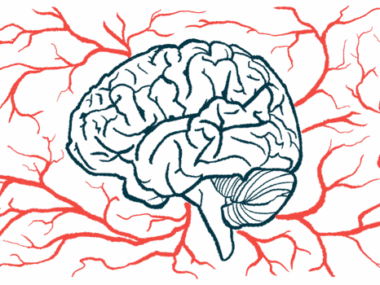Reflecting on my daughter’s early developmental regression
How my child missed milestones and lost skills before her Rett diagnosis
Written by |

Children with Rett syndrome typically go through a regression in their development between the ages of 6 and 18 months, but I didn’t notice Cammy, our daughter with Rett, regressing that soon. Instead, I saw some slower development early and more of a stagnation of skills when she was 8 months old. The noticeable and concerning regression didn’t start until 10 months and continued for eight more; she was diagnosed at 20 months.
I’d seen other children develop and hit their milestones. Before having my own, I had 11 nieces and nephews and had spent time around kids my entire life. Plus, I was a teacher. Beyond that, Cammy and two of her cousins, Anthony and Olivia, were all born within six weeks of one another. They spent a lot of time together during their first year of life. I know parents shouldn’t compare their children with peers, but such a comparison was crucial in helping me understand Cammy’s development, or lack thereof.
I vividly remember my brother holding Olivia’s hands as she stood, able to bear her own weight, at 4 months old. When I tried to do that with Cammy at the same age, her legs would go up to her chest as if the ground were on fire. I just attributed it to Olivia being incredibly strong, like my brother. I didn’t know children were supposed to be able to bear weight that easily until I watched our neurotypical second child, Ryan, develop.
Not the changes we expected
Cammy sat independently at 6 months old, which is in line with that particular milestone. When she was 8 months old, she started slouching while sitting, then fell backward after several minutes. While Anthony and Olivia were getting stronger and moving on to the next milestone, Cammy wasn’t going forward; in fact, she was staying put or falling back.
As each month passed, Anthony and Olivia would pick up a new skill, such as crawling, pulling themselves up to stand, walking with assistance, then finally walking independently. These skills appeared from 9 to 12 months, making it glaringly obvious that Cammy wasn’t progressing as her cousins were. Yet each time I took Cammy to the pediatrician, the doctor told me, “Wait and see. Children develop differently.”
When Cammy was 1 year old, she clearly had very low muscle tone. Her back was rounded when we tried to have her sit independently. She could sit unassisted for only a minute before falling backward. We always had to support her from behind.
During this time, Cammy was dropping items that were in her left hand. She clearly preferred her right hand, despite all the exercises we did to promote her using her left. Then Cammy’s left hand began going into her mouth. By 14 months, she pretty much lost all function of her left hand, and it was constantly in her mouth.
At her one-year doctor appointment, the pediatrician finally seemed concerned and wrote Cammy a prescription for physical therapy. We also had her evaluated for the Illinois Early Intervention services, and she qualified for physical therapy, occupational therapy, speech therapy, and developmental therapy. Cammy was behind in all these areas and would soon receive all of these therapies each week until she aged out at 3 years old.
Cammy, now 14, continued to regress, losing purposeful use of her right hand by the time she was 18 months old. Informed by my plentiful experience with children, comparisons with her cousins and others, and my gut instinct, I knew she had more than a simple developmental delay. The diagnosis confirmed my suspicions.
Note: Rett Syndrome News is strictly a news and information website about the disease. It does not provide medical advice, diagnosis, or treatment. This content is not intended to be a substitute for professional medical advice, diagnosis, or treatment. Always seek the advice of your physician or other qualified health provider with any questions you may have regarding a medical condition. Never disregard professional medical advice or delay in seeking it because of something you have read on this website. The opinions expressed in this column are not those of Rett Syndrome News or its parent company, Bionews, and are intended to spark discussion about issues pertaining to Rett syndrome.







Leave a comment
Fill in the required fields to post. Your email address will not be published.